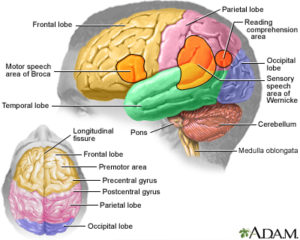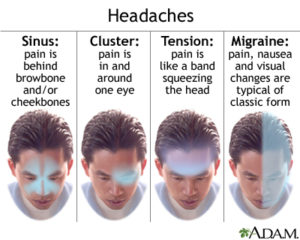Headache |
||
DefinitionA headache is pain or discomfort in the head, scalp, or neck. Serious causes of headaches are rare. Most people with headaches can feel much better by making lifestyle changes, learning ways to relax, and sometimes by taking medicines. Alternative NamesPain – head; Rebound headaches; Medication overuse headaches; Medicine overuse headaches CausesThe most common type of headache is tension headache. It is likely caused by tight muscles in your shoulders, neck, scalp, and jaw. A tension headache:
A migraine headache involves severe pain. It usually occurs with other symptoms, such as vision changes, sensitivity to sound or light, or nausea. With a migraine:
Rebound headaches are headaches that keep coming back. They often occur from overuse of pain medicines. For this reason, these headaches are also called medicine overuse headaches. People who take pain medicine more than 3 days a week on a regular basis can develop this type of headache. Other types of headaches:
In rare cases, a headache can be a sign of something more serious, such as:
Home CareThere are things you can do to manage headaches at home, especially migraines or tension headaches. Try to treat the symptoms right away. When migraine symptoms begin:
A headache diary can help you identify your headache triggers. When you get a headache, write down the following:
Review your diary with your health care provider to identify triggers or a pattern to your headaches. This can help you and your provider create a treatment plan. Knowing your triggers can help you avoid them. Your provider may have already prescribed medicine to treat your type of headache. If so, take the medicine as instructed. For tension headaches, try acetaminophen, aspirin, or ibuprofen. Talk to your doctor if you are taking pain medicines 3 or more days a week. When to Contact a Medical ProfessionalSome headaches may be a sign of a more serious illness. Seek medical help right away for any of the following:
What to Expect at Your Office VisitYour provider will take a medical history and will examine your head, eyes, ears, nose, throat, neck, and nervous system. Your provider will ask many questions to learn about your headaches. Diagnosis is usually based on your history of symptoms. Tests may include:
ReferencesDigre KB. Headaches and other head pain. In: Goldman L, Schafer AI, eds. Goldman’s Cecil Medicine. 25th ed. Philadelphia, PA: Elsevier Saunders; 2016:chap 398. Ferri FF. Cluster headache. In: Ferri FF, ed. Ferri’s Clinical Advisor 2016. Philadelphia: PA Elsevier Mosby; 2016:347. Schoenen J, Sava SL. Tension-type headache. In: McMahon SB, Koltzenburg M, Tracey I, Turk DC, eds. Wall and Melzack’s Textbook of Pain. 6th ed. Philadelphia, PA: Elsevier Saunders; 2013:chap 59. |


